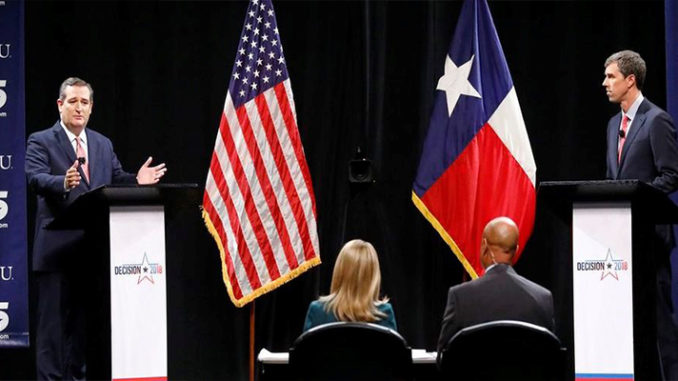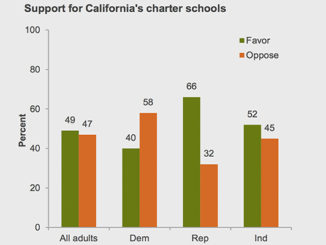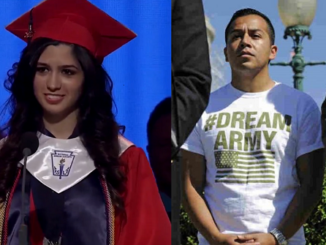
by Beth Hawkins, the74
EDlection 2018: From coast to coast, The 74 is profiling a new campaign with major implications for education policy each and every week. See our complete archive of profiles, previews, and interviews at The74Million.org/Election — and get the latest snapshots sent straight to your inbox by signing up for The 74 Newsletter. (Also watch for our Election Night live blog Nov. 6!)
As the husband of an education reformer, Texas Rep. Beto O’Rourke walks a fine line on school choice in challenging Ted Cruz for senate.
At an event hall in Houston, Beto O’Rourke mounted a stage lined with shimmery white wedding tulle and took a crowd of supporters to church. A staple of retail politics, the August gathering was one of a series of town hall meetings that have characterized his bid for a U.S. Senate seat, this one focused on education. Equal parts folksy and self-deprecating, the three-term congressman kicked things off by hailing teachers as heroes.
“At a time when teachers are forced to face the pressure and the high stakes of standardized tests,” educators should be celebrated for remaining on the job, he said, going on to press nearly every education hot button of the moment. He decried racial achievement gaps and called for “wraparound” social services in schools, greater diversity in the teaching profession, and an end to racial disparities in student discipline.
In a shot aimed directly at his opponent, Republican incumbent and onetime presidential candidate Ted Cruz, O’Rourke blasted the notion that teachers should be armed.
“I want those teachers focused on problems like Beto O’Rourke, who was stuck in remedial algebra for three years,” he quipped. “Bring him home to calculus.”
As an audience of about 200 roared, O’Rourke railed against Texas’s bare-bones school funding, sounded cautionary notes about evaluating teachers, and inveighed against educators trained outside the traditional system: “We debase them by comparing them to retail salespeople by saying anyone can be a teacher after perhaps a week’s training.”
In a sign of how closely voters nationwide are tracking his campaign, the Facebook video of the event has been viewed more than 20,000 times. Commenters, many thousands of miles away, pledged donations.
“You are absolutely correct,” Chicago Public Schools teacher Claudia Moreno-Nunez chimed in from afar. “Public education is under attack. Thank you for standing up for teachers!”
Oddly, the topic of public charter schools, typically the marquee item on an agenda like O’Rourke’s, did not come up at all. Nor did the fact that O’Rourke’s wife, Amy, directed an El Paso charter school as well as a civic and philanthropic push to increase the number of high-performing schools in the region, in part by attracting new charter school networks.
The O’Rourke campaign declined The 74’s interview requests, while Cruz’s campaign did not respond. But a review of O’Rourke’s public statements about education policy suggests he has been threading the needle by staying silent about nonprofit charter schools while narrowly focusing his criticism on the for-profit variety, and seeking to distinguish himself from Cruz by decrying vouchers and other forms of private school choice.
O’Rourke can walk this fine line, education policy watchers suggest, because teacher unions and other critics likely see Cruz as a larger existential threat.
According to press reports, when the O’Rourkes met in 2004, Amy had just returned from teaching kindergarten at Colegio Americano de Guatemala. In 2007, she became superintendent of a new public charter school, La Fe Preparatory School, operated by an El Paso community organization. She left that job in 2012, according to her LinkedIn profile.
Currently, Amy O’Rourke is the director of Choose to Excel, an initiative of the Council on Regional Economic Expansion and Educational Development, or CREEED, a four-year-old group advocating for better educational attainment in the El Paso area. Choose to Excel’s mission includes engaging families, investing in teacher training, boosting the number of high-performing schools in the region, and increasing college graduation rates by raising the number of high school graduates who are ready for college.
Among the efforts she has participated in were a 2016 trip to visit IDEA Public Schools in Texas’s Rio Grande Valley and a 2017 education summit that sought, among other things, to showcase El Paso to charter school networks that might consider the region for expansion.
Last November, The 74 obtained emails from El Paso Federation of Teachers President Ross Moore asking the American Federation of Teachers to “begin interfering with” El Paso ISD Superintendent Juan Cabrera’s relationship with universities training district dual-language teachers, to cause problems in the bond market for the nonprofit IDEA charter network, and to “turn members and other [district] employees against Cabrera.”
Nonetheless in February, the National Education Association-affiliated Texas State Teachers Association endorsed Beto O’Rourke, issuing a statement that made no mention of charter schools and detailed the many positions the union and congressman share.
“By contrast, Beto’s opponent has turned his back on Texans by engineering a costly government shutdown in 2013 and undermining public schools by collaborating with Betsy DeVos to create a costly voucher scheme aimed primarily at a privileged few,” union president Noel Candelaria said in the statement.
Though Congress has little impact on what happens in classrooms at the local level, education is a top concern for voters, so on the campaign trail, O’Rourke and Cruz are talking about issues that state legislatures and school boards have more control over.
Why campaign on education at all? Because the way candidates talk about K-12 issues telegraphs something about their ideology, say political scientists watching the race — and Cruz and O’Rourke are good examples.
Cruz’s platform-topping issues — school vouchers and arming classroom teachers — are headline-grabbers that signal his opposition to gun control and his commitment to free-market principles, said Joshua Blank, manager of polling and research at the Texas Politics Project at the University of Texas at Austin.
As far as O’Rourke is concerned, given that it’s been 24 years since Texas elected a Democrat to statewide office, it’s perhaps no surprise he would pull out all the stops trying to get Latinos and a disaffected left flank to the polls.
“Education is a very good way to convey your commitment to broader issues,” said Blank. “When you talk about a more fair, robust education system, you’re really talking about access to opportunity. It’s really more about these secondary aspects.”
Sherri Greenberg, a professor at the University of Texas at Austin’s LBJ School of Public Affairs, said O’Rourke needs to send a signal to certain populations. “He has to look at independent, suburban moms and potentially a Latino population that doesn’t vote but for whom this is important.”
She added that O’Rourke’s decision to reject donations from political action committees means he has to appeal to individuals for campaign funds: “When you look at what those smaller donors are motivated by … education is a core issue.”
The fact that news media have not picked up on the role Amy O’Rourke plays in El Paso’s educational landscape? “It goes to the way [Beto] O’Rourke is treated by the press that no one has asked about it,” said Blank.
The congressman has little in the way of an education voting record to dissect. He has voted in favor of federal charter school startup funding and voted against reauthorizing Washington, D.C.’s private school voucher program in 2015. At the time, he issued a statement saying he opposed the measure “because I think we should allow the District of Columbia to invest the amount included in this bill in the public education system, including teacher training and expanding other proven educational models such as charter schools.”
Attorney Sandy Kress, an architect of the 2001 No Child Left Behind Act — which mandated the annual student tests that O’Rourke rails against — said he doubts that when it comes to education, either candidate is likely to disrupt the status quo. Neither Cruz nor O’Rourke has shown any indication of interest in the centrist K-12 reforms of the Bush and Obama administrations.
“You don’t run as a Republican or a Democrat with a reform agenda,” he said. “It hasn’t helped for five or 10 years. In the general election, you’re not going to get any points for it. All you’re going to do is infuriate the establishment.”



